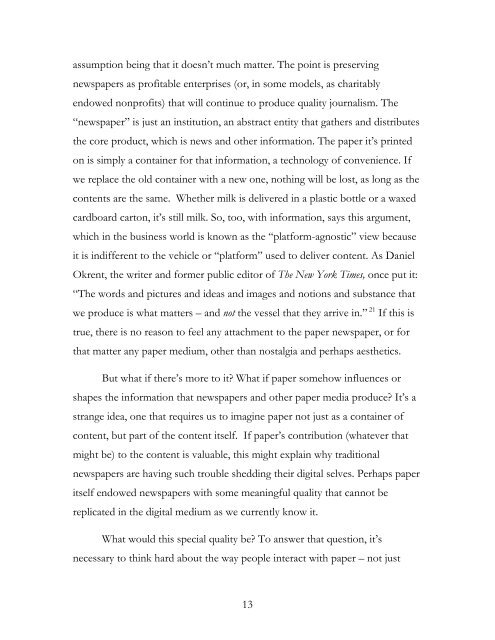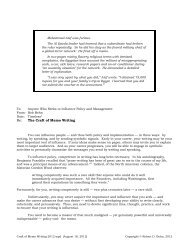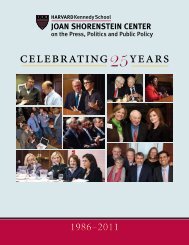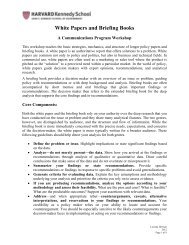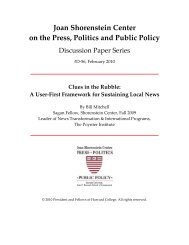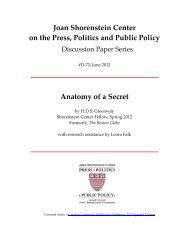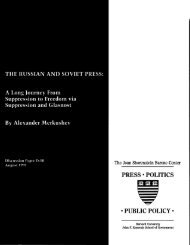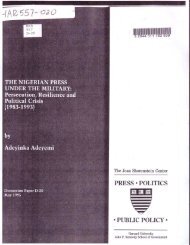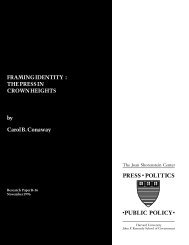Why Paper Is Eternal - Joan Shorenstein Center on the Press ...
Why Paper Is Eternal - Joan Shorenstein Center on the Press ...
Why Paper Is Eternal - Joan Shorenstein Center on the Press ...
You also want an ePaper? Increase the reach of your titles
YUMPU automatically turns print PDFs into web optimized ePapers that Google loves.
assumpti<strong>on</strong> being that it doesn’t much matter. The point is preserving<br />
newspapers as profitable enterprises (or, in some models, as charitably<br />
endowed n<strong>on</strong>profits) that will c<strong>on</strong>tinue to produce quality journalism. The<br />
“newspaper” is just an instituti<strong>on</strong>, an abstract entity that ga<strong>the</strong>rs and distributes<br />
<strong>the</strong> core product, which is news and o<strong>the</strong>r informati<strong>on</strong>. The paper it’s printed<br />
<strong>on</strong> is simply a c<strong>on</strong>tainer for that informati<strong>on</strong>, a technology of c<strong>on</strong>venience. If<br />
we replace <strong>the</strong> old c<strong>on</strong>tainer with a new <strong>on</strong>e, nothing will be lost, as l<strong>on</strong>g as <strong>the</strong><br />
c<strong>on</strong>tents are <strong>the</strong> same. Whe<strong>the</strong>r milk is delivered in a plastic bottle or a waxed<br />
cardboard cart<strong>on</strong>, it’s still milk. So, too, with informati<strong>on</strong>, says this argument,<br />
which in <strong>the</strong> business world is known as <strong>the</strong> “platform-agnostic” view because<br />
it is indifferent to <strong>the</strong> vehicle or “platform” used to deliver c<strong>on</strong>tent. As Daniel<br />
Okrent, <strong>the</strong> writer and former public editor of The New York Times, <strong>on</strong>ce put it:<br />
“The words and pictures and ideas and images and noti<strong>on</strong>s and substance that<br />
we produce is what matters – and not <strong>the</strong> vessel that <strong>the</strong>y arrive in.” 21 If this is<br />
true, <strong>the</strong>re is no reas<strong>on</strong> to feel any attachment to <strong>the</strong> paper newspaper, or for<br />
that matter any paper medium, o<strong>the</strong>r than nostalgia and perhaps aes<strong>the</strong>tics.<br />
But what if <strong>the</strong>re’s more to it? What if paper somehow influences or<br />
shapes <strong>the</strong> informati<strong>on</strong> that newspapers and o<strong>the</strong>r paper media produce? It’s a<br />
strange idea, <strong>on</strong>e that requires us to imagine paper not just as a c<strong>on</strong>tainer of<br />
c<strong>on</strong>tent, but part of <strong>the</strong> c<strong>on</strong>tent itself. If paper’s c<strong>on</strong>tributi<strong>on</strong> (whatever that<br />
might be) to <strong>the</strong> c<strong>on</strong>tent is valuable, this might explain why traditi<strong>on</strong>al<br />
newspapers are having such trouble shedding <strong>the</strong>ir digital selves. Perhaps paper<br />
itself endowed newspapers with some meaningful quality that cannot be<br />
replicated in <strong>the</strong> digital medium as we currently know it.<br />
What would this special quality be? To answer that questi<strong>on</strong>, it’s<br />
necessary to think hard about <strong>the</strong> way people interact with paper – not just<br />
13


